- Home
- Jane Smiley
Duplicate Keys Page 2
Duplicate Keys Read online
Page 2
“What?”
“Do you think she’s reacting oddly?”
“Rya? No.”
“Hmp.”
Unable to interpret this, Alice said, “Do you?”
Noah shrugged. Alice often wondered why after nearly four years of marriage the Masts still talked as if the interest of their friends in every wrinkle of their relationship was a foregone conclusion. He called out, “Sweetie?”
“Out in a flash!” came from behind the bathroom door. Ray liked the bathroom off the living room, but in the silence Alice found herself listening for the flush of the toilet, the rush of water. Noah, his head cocked, was listening, too, but then caught himself and said, “I can’t ever gauge the depths, you know. I think I’m basically sort of a cold person, but she really feels it in her soul.” Alice had her doubts. He put one of the joints to his lips and struck a friction match under the desktop. In a moment he gestured with the joint toward Alice, who shook her head. She usually shook her head and then felt rather drab with the Masts. They also always made her reconsider her clothes. The calico skirt and cotton blouse that had seemed perky and brave when she left her apartment seemed dowdy and bland under Ray’s mirror, in the same room with Rya’s shorts, across from Noah’s little grid of reefers. The key turned in the lock and the door flew open. It was Ray with a huge bag of food. In a moment Rya appeared, shooting straight for it, then moaning over the mo-shu pork, the oysters with straw mushrooms, the gong-bao chicken with charred red peppers and cashews, the sizzling rice soup, the shrimp toast. It must have cost Ray twenty-five or thirty dollars. And there were shao-mai dumplings at the bottom. Rya reached into the bag, her red fingernails promising to impale rather than to grasp one of the delicate hors d’oeuvres. Alice stood up. She was hungry, too.
She wondered if the others were thinking constantly of Denny and Craig and Susan, as she was. Of course, they had not seen the bodies there, luminously without life, without even the life of the chairs and tables and rugs, not to mention the growing plants and the lamps and appliances coursing with electricity. But then, Noah and Ray, at least, would have seen Denny and Craig last night or the night before, perfectly alive, completely themselves, annoying, familiar, entertaining all at once. Especially Craig, Alice thought, who managed to elicit from her an exact conjunction of vexation and desire that years of friendship had not gotten her used to. And murdered! Murdered! The shock of it startled her again and again, like random hammering right next to her ear. She placed a pancake on her plate, spread it with hoisin sauce, and spooned on the pork and egg mixture. Ray said, “These oysters are terrific. Craig would have just creamed over them.”
“He loved that restaurant,” said Noah. A great sigh lifted from the table, and Ray said, “Remember how he wouldn’t even taste Chinese food five years ago because it was all mushed together?”
“A very weird guy,” said Noah. “I just can’t believe it.”
Ray dipped his spoon into the bean curd. “I can. You know, I really can. Think about it. Craig Shellady living to a ripe old age? Are you kidding?”
Alice said, “Weren’t his folks about this age when they died in that car wreck?”
Ray ignored her. “Denny, yes. Denny with seventeen grandkids in the country somewhere, watching the polls on election days, perfect. Tapping maple trees, building more shelves to store more canned tomatoes, yes, yes.”
Alice coughed. “His mother was, I think. His father must have been nearly forty. Craig was eleven or twelve, anyway.”
Rya sat back with a stricken look. “I didn’t know Craig was orphaned. I mean, orphaned!”
Noah rolled his eyes. “Well, he told you umpteen times that his parents were dead and that he’d lived all those years with the Mineharts!”
“But I didn’t realize he was orphaned! Like somebody in an asylum!”
“He never lived in an asylum. He had plenty of aunts and uncles, and the Mineharts, and he was perfectly well taken care of.”
“Orphaned! Can you imagine what it’s like to be orphaned!” Noah put his arm around her and kissed her on the temple, but with the air of putting his hand over her mouth. “Anyway,” said Ray, his chopsticks poised above his plate, “it’s weird. I always thought he was doomed, but I can’t believe he’s dead.” Noah said, “Has anyone called Denny’s parents?” Everyone looked at Alice, who shrugged. “I hardly know them. I told the police their name and address.” She shivered. The Mineharts were crazy about Craig, and Denny was probably their favorite child. No one was warmer or more reliable than Denny. She said, “Lots of people are going to have to know. That’s the worst part.”
“No,” said Noah. “Susan’s the worst part. What are you going to do about Susan?”
Alice had rather shunned the thought of Susan all afternoon. Susan had lived with Denny for years, nearly as long as Alice had known her, and, in Alice’s view, they had the only nearly perfect relationship Alice had ever seen. Alice felt about it as one might feel living next door to a historic monument. She was proud of it, anxious to show it off, knowing it wasn’t hers but as reassured by it as if it were. Susan dazzled with her domestic competence, her way with tax forms and vegetables and hospitality and decor. Because of Susan, people always wanted to hang around that apartment, partake not merely of the comfort she had created, but also of the comfort between her and Denny. Equally comfortable were her departures, her undramatic efforts to go away by herself, that neither she nor Denny made much of. Perhaps Alice had always envied these even more, since partings from Jim Ellis had been fraught with anxiety and had always ended in arguments, at the very least, about why he hadn’t written enough, or why she had written too much. And then, of course, they had ended in parting, possibly their inevitable end, Alice occasionally thought. But Susan and Denny had gone on and on and on, longer than any of their friends, longer than any friends of their friends. Alice put her fork down. “I don’t know,” she said. “And we haven’t done anything, have we? Where are they going to be buried? How will they get there? Is there going to be a funeral? Who’s going to take care of the apartment? I don’t even know what time Susan is getting here tomorrow. Should I sit outside her building and wait for her? She could come any time.”
“And talk to the press,” said Ray. “They’ve been ringing the phone off the hook. I put it on the service for tonight, but I bet when I call there’s going to be fifty messages.”
“Rolling Stone?” asked Alice.
“And everyone else, believe me.”
Alice didn’t say anything. Noah lit up another joint and said, “I didn’t think Craig was doomed for a moment. Crazy, yes, doomed, no. Yeah, he did all that stuff, especially cocaine, and I bet none of you knew that he tried heroin that time he was in California.” Alice remembered when Craig was in California. “But he was always looking. Never missed a trick. Once he had me on the back of his motorcycle, that BMW, and we must have been doing about ninety, and he bent down and lit his cigarette on the cylinder casing. I never felt in danger for a moment, but I can’t tell you why. That same trip, a bug flew into his sunglasses and broke the lens. We just laughed about it and taped it up.”
“Just because you’re a fool,” said Ray, “doesn’t mean he wasn’t.”
“I don’t know about that. I will say, though, that I’d rather be on the back of that motorcycle doing a hundred than in almost any cab in New York.” He inhaled deeply from the joint that only he and Ray were smoking and went on, “It just always seemed that if there was anyone with eyes in the back of his head and the reflexes to get out of trouble, it was Craig, you know?”
“That’s what was so weird about this,” said Alice, realizing it for the first time. “I think the reason I couldn’t believe what I saw was that there didn’t look like there had been any trouble. That’s just the word. Something more subtle than no struggle, no trouble of any kind, as if nothing bad had taken place. When you’re little, sometimes other kids have these rubber spiders and things, and you get shocked bef
ore you know it. Well, this was just the opposite. I couldn’t believe that it wasn’t a joke. I couldn’t get shocked, even with the smell. And then, this afternoon, I felt funny, but as if I had the flu. Maybe I should have touched one of them.”
“There wouldn’t have been any smell,” said Ray. “Not so soon.”
“Well, there was.”
“After, what, eight hours? You’re imagining things.”
“Well, I’m not going to argue about it.”
“Oh, God,” said Rya. The conversation died.
Taking the last spoonful of bean curd, Noah said, “Just the other day we were rehearsing for this gig. Just setting up, really. That new guy, Zimmerman, the one Craig hired for percussion a few weeks ago, spilled a glass of water on the stage. No one saw but me. He hit it with his sleeve or something. Craig went over to fiddle with the amps. His guitar was on, and he had one hand around the neck, and he reached for one of the dials and lifted his foot. I opened my mouth to call out to him, and shit if he didn’t step just to one side of the water, and then he put his other foot just in front of it. I mean, you don’t know if he would have gotten a shock, but I thought to myself, there’s a lucky guy, there’s the classic example of a lucky guy.”
“And then he chewed Zimmerman out and practically fired him on the spot, didn’t he?” asked Ray, who hadn’t been there.
“You know Shellady. Patience wasn’t exactly his middle name.”
“Not hardly,” agreed Ray.
“I just think it’s the most awful thing.” Rya had thrown herself back against the giant gray pillows of Ray’s sofa. “We all do,” said Noah. “Shhh.”
“Did anyone call Zimmerman?” asked Alice.
“He’s been in the studio all day with some guys from the Coast. He probably knows by now, though.”
“Did you call Jim?” Noah dropped this rather tenderly into the conversation while Ray pretended to be busy cleaning off the table. Jim Ellis was as long a friend of the others as she was. “I should, shouldn’t I?” She glanced around.
“Do you want me to?” asked Ray.
“No thanks. Jim is so determined to be amicable that if I didn’t call, he’d assume I was too prostrate to talk to anyone.”
“I don’t see how you can put up with this by yourself,” whimpered Rya.
“Better one than three. I mean, what if he came and brought her? I’ll call him tonight. It’s only six there now.” She looked at each of their sympathetic faces and added, “I don’t mind talking to him, really. It’s been almost two years, you know.”
“Has it been that long?”
“It’s been that long since the final split, really and truly.”
“Amazing,” exclaimed Noah, holding another joint up in front of his face and admiring it, then putting it carefully with the others in his breast pocket. Watching him, Alice felt suddenly giggly, perhaps because after such an odd day, their evening meal hadn’t been odd at all, but familiar, usual, with each friend so much himself. They hadn’t forced any description out of her and the scene, having not been described, seemed to recede. Other people were dead and she was not. The fragrance of the trees on Riverside blowing in through Ray’s window reminded her fiercely that it was good not to be dead. She pursed her lips to stop a giggle, and said, “I’d better go.”
“Not alone,” said Noah. Rya stood up. “Let’s call each other tomorrow,” she said. “We should know what’s going on first thing, especially about Susan.”
“By the time Rya gets up,” Noah put his arm around her shoulders, “most first things have happened long since.”
“That’s not true!”
THE double row of stoplights and streetlights tapered to the vanishing point somewhere downtown, and the few vehicles on the broad expanse of West End Avenue seemed to Alice to roll with the deliberation and elegance of barouches in a park. It was a pretty sight, down the long slope toward Eighty-ninth Street, but there were no cabs. Noah and Rya, who lived nearby on Riverside, discussed walking Alice over to Broadway. Another man, about twenty yards away, appeared to be waiting as well. “Something will come along,” said Rya.
“Look. Two just went by going downtown on Broadway.”
“Just another minute or two,” said Rya.
“Why?”
“I just have a feeling something will come along.”
The man had edged closer. Alice didn’t mind waiting forever, the western breeze off the river was so gustily warm, practically as firm as another body against hers. “Now,” said Noah.
“Just wait a little longer,” said Rya. “The longer we wait, the sooner it’ll be until a taxi comes.”
“That’s ridiculous.”
The man was almost upon them. Alice stepped closer to Noah. The man said, “Waiting for a cab?”
“Yeah,” said Noah, surly.
“Me, too. Going downtown?”
“Only fifteen blocks or so,” demurred Noah.
“Me, too. How about sharing?”
By the streetlight Alice could see that he was about their age and dressed in a plaid shirt and jeans, just as Noah was. Noah glanced at her and she shrugged. Noah said, “Might be easier,” in a voice of studied doubtfulness.
“I’ve been waiting ten minutes.”
“Why don’t you go over to Broadway?”
“Lazy. Prettier here, anyway.”
Noah looked for a long second at Alice, then back at the man. “Let me see your driver’s license or something,” he said.
Unhesitatingly, the other man brought out his wallet, opened it, and presented the license to Noah. Noah said, “Henry Mullet. Remember that, Rya, Henry Mullet. We’re not going. It’s just Alice. Alice, this is Henry Mullet.” Right then a cab appeared around the corner of 106th Street. Henry waved it over, Rya embraced Alice, Noah gave her a kiss and told her to buck up and call him when she got home and any other time, absolutely any other time, they had to stick together, and suddenly she was in the cab and Henry was wiggling around to put his wallet away. Alice said “Eighty-fourth Street” to the cabbie and they sped away.
Henry Mullet smelled wonderful, as if he had been in the sun all day, tanning with coconut oil. Unable to resist, but as impersonally as possible, Alice said, “Have you been to the beach?”
“I was, actually. Fire Island.”
“Was it hot enough to sun?”
“It was out there. How did you guess?”
Alice didn’t answer.
“How did you guess? I put on clean clothes at my friends’ place.”
“I’m embarrassed to say.”
“Tell me.”
“You smell terrific.”
Henry Mullet grinned. Doing a perfect twenty-seven miles per hour, the cab made light after light, reds turning to greens like doors opened by footmen. Henry said, “You’re Alice? Alice what?” Alice told herself that she would remember to tell Noah that he had asked her name. “Alice Ellis,” she replied.
“Are you kidding?”
“Not kidding a bit.” Henry Mullet chuckled with frank enjoyment. They were passing Ninetieth Street. “One of the pitfalls of early marriage.”
“It’s a nice name. It goes trippingly on the tongue.”
“No one could spell my maiden name, so I kept it.” They were passing Eighty-seventh Street. The cabbie said, “Where on Eighty-fourth, lady?”
“Halfway to Riverside, but you can drop me at the corner.”
“Me, too.” As Henry spoke, a little reflexive fear rose in Alice’s chest. How could she have been so foolish after all? She crossed the fingers of the hand away from him. But after all, he had heard Noah tell her to call him. And Noah knew his name. Alice coughed. The cab stopped and Henry had the fare; even as Alice was reaching into her purse, he was thrusting it into the cabbie’s box, opening Alice’s door for her, helping her out. As the taxi squealed away, he said, “Let’s walk in the middle of the street. My building’s that gray one with the awning, down there.” It was just across the street fro
m hers. Suddenly trusting, she said, “Mine’s right there. Funny, huh?”
“Maybe.” He took her elbow and propelled her down the center of Eighty-fourth Street. “More light, less dog-do,” he said.
Alice laughed at the word. At a spot just between their buildings, he said, “I’ll stay here till you get in.”
“Thank you.”
“Wave to me sometime from your window.”
As Alice fit her various keys into the front doors, she turned and looked back at him. He was standing gravely in the middle of the street watching her.
2
JUST as Alice stood up from talking to Noah, already formulating in her mind how she was going to greet Jim, what tone of voice she would strive for, what she would say if Mariana answered, whether it would be better to call now, when it was eight o’clock their time, or wait an hour until nine, the phone rang, startling her so that she just stared at it for two more rings. She thought of Detective Honey, and wondered if he might be checking up on her. It was Ray. She thanked him for their generous dinner.
“Don’t thank me,” said Ray. “Whenever I go into that place, I can’t stop ordering.”

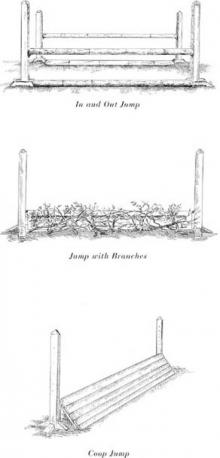 The Georges and the Jewels
The Georges and the Jewels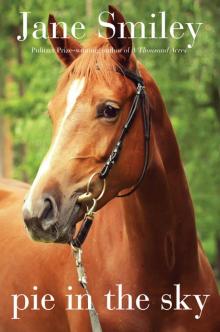 Pie in the Sky: Book Four of the Horses of Oak Valley Ranch
Pie in the Sky: Book Four of the Horses of Oak Valley Ranch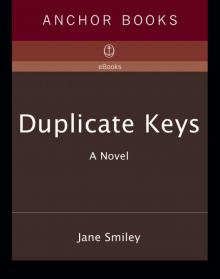 Duplicate Keys
Duplicate Keys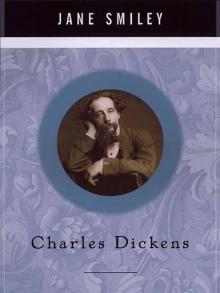 Charles Dickens
Charles Dickens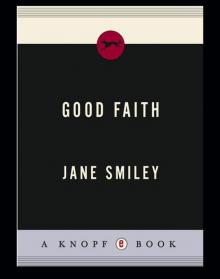 Good Faith
Good Faith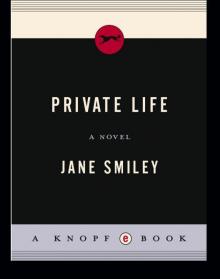 Private Life
Private Life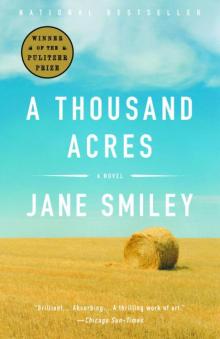 A Thousand Acres: A Novel
A Thousand Acres: A Novel The Greenlanders
The Greenlanders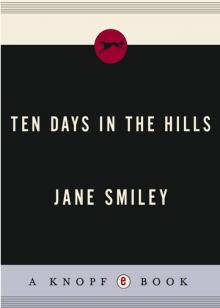 Ten Days in the Hills
Ten Days in the Hills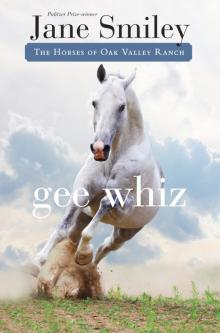 Gee Whiz: Book Five of the Horses of Oak Valley Ranch
Gee Whiz: Book Five of the Horses of Oak Valley Ranch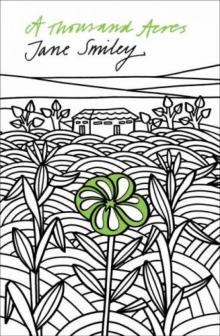 A Thousand Acres
A Thousand Acres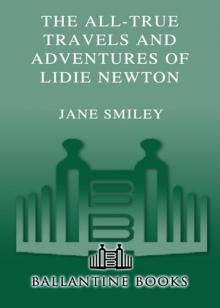 The All-True Travels and Adventures of Lidie Newton
The All-True Travels and Adventures of Lidie Newton Ordinary Love and Good Will
Ordinary Love and Good Will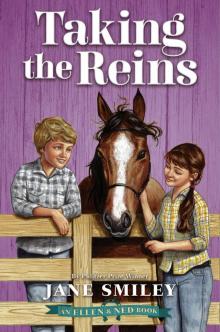 Taking the Reins (An Ellen & Ned Book)
Taking the Reins (An Ellen & Ned Book)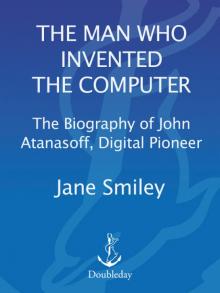 The Man Who Invented the Computer
The Man Who Invented the Computer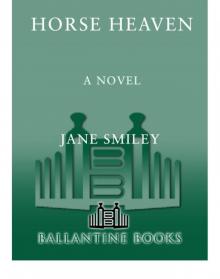 Horse Heaven
Horse Heaven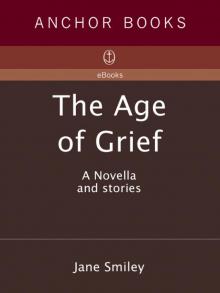 The Age of Grief
The Age of Grief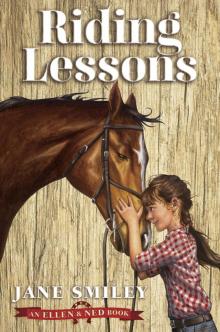 Riding Lessons
Riding Lessons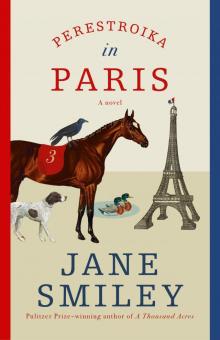 Perestroika in Paris
Perestroika in Paris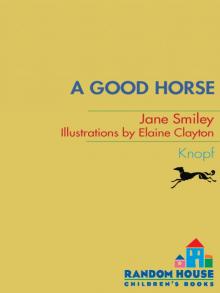 A Good Horse: Book Two of the Horses of Oak Valley Ranch
A Good Horse: Book Two of the Horses of Oak Valley Ranch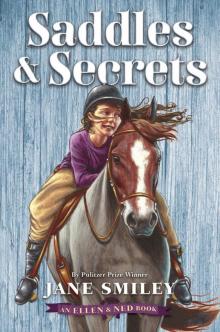 Saddles & Secrets (An Ellen & Ned Book)
Saddles & Secrets (An Ellen & Ned Book)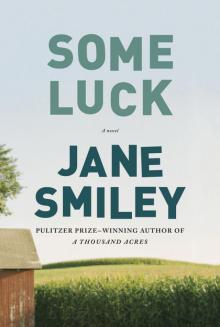 Some Luck: A Novel
Some Luck: A Novel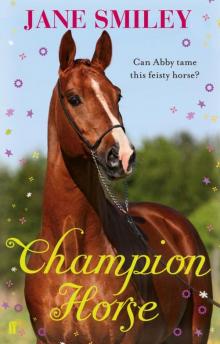 Champion Horse
Champion Horse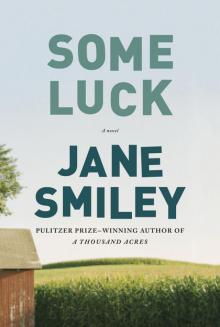 Some Luck
Some Luck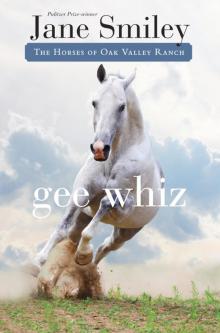 Gee Whiz
Gee Whiz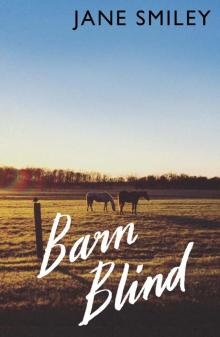 Barn Blind
Barn Blind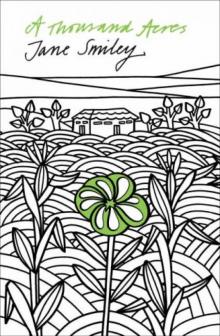 A Thousand Acres (1992 Pulitzer Prize)
A Thousand Acres (1992 Pulitzer Prize)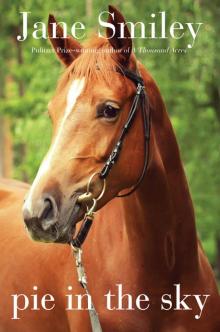 Pie in the Sky
Pie in the Sky True Blue
True Blue A Thousand Acres_A Novel
A Thousand Acres_A Novel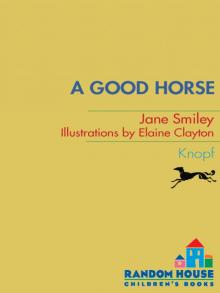 A Good Horse
A Good Horse